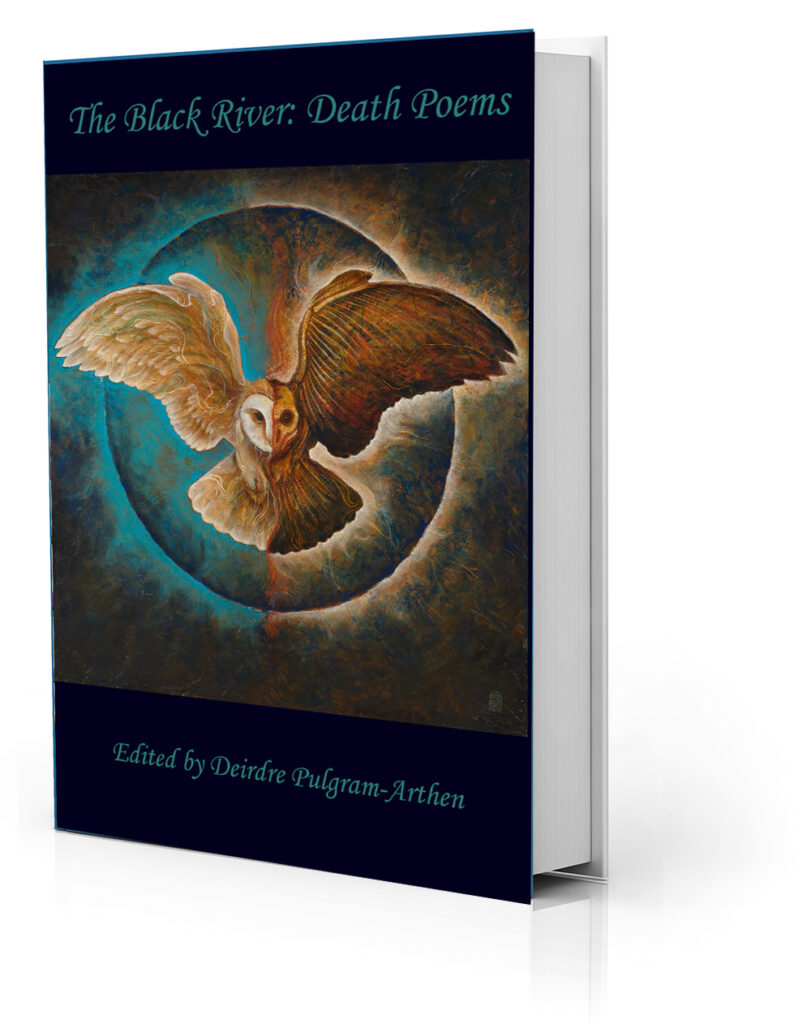Home > Resources > The Black River: Death Poems
The Black River: Death Poems
Edited by Deirdre Pulgram-Arthen
Excerpt:
The Black River: Death Poems is an anthology of poems for people who are grieving and for use in death rituals. Sixty-nine authors from eight countries have contributed to this anthology of 149 poems grouped into four stages: dying, death, remaining, and journeying. The poems are heavily indexed: by relationship to deceased; by suggested use in ritual; and by theme (memory loss, pregnancy loss, long and short illness, hope, acceptance of death, and violence, war, and suicide). Edited by Deirdre Pulgram-Arthen, an experienced death midwife, counselor, and death ritual leader, this book is nondenominational and brings together contemporary poets writing on the many stages of grief and death.
Deirdre Pulgram-Arthen shares:
… We all experience death in our lives, and each time it brings us something new. Whether this time you are angry or bereft, confused or resolute, lost or awakened, there is something here for you. Whether you have lost a parent or a child, a friend or a pet, something in this volume speaks to the experience of that kind of loss for someone else, in very personal terms, with no assumption that your loss will feel the same way.
The Black River is divided into four sections to reflect the process we move through at the end of life—from dying into death, and then, for the survivors, entering the turmoil of remaining, followed by the journey forward, whatever shape that takes. There are poems for personal reflection and poems that are marked as lending themselves to ritual use. I can imagine opening the book as I sit with someone in hospice and quietly reading to myself, or finding something to read aloud to the dying person or others in the room. I can equally imagine myself as a ritual celebrant in a room or a circle of grieving community members, holding the book and reading something that will open their hearts and ease their spirits. And I can imagine coming home, after the burial of someone I love, after the crowd has gone and the casserole dishes are washed up and put away, to read something that will help me sleep that night. …
You Could Tell Yourself
by Zeina Azzam
You could tell yourself almost anything.
That when you look at your mother
on her deathbed you say well, she had a full life.
You see that her diaphragm is no longer rising
from a sacrum once rife with life
and it makes you wonder about her final breath,
is it still in the room and can you breathe it in too,
carry it in your veins.
You know that her favorite blouse is scissored open
in the back for easy dressing and it makes you consider
which of your own clothes you will die in,
which ones will be given away to strangers.
You could tell yourself that these are ephemeral things,
that living to the fullest is what is important
and then you ask, what does that mean.
There are songs on the shelf that make your tears flow,
books that tell of journeys toward an inner heaven
or one beyond. There are the good deeds that maybe
made someone’s life better. Then there is this love
that overwhelms you, for her, for your brother
who, with you, is the only one left, for your children
who you are terrified might also die before you.
It sits heavily like the thick roots of an old tree,
its high branches and leaves trying to fly….
You want to believe this love has a lightness
like that too, that it will fly and last beyond
your physical body and hers, that people remember
the dead this way despite the dark absence.
You could believe it. And then you think
of your mother on her deathbed and you realize
you do. That nothing is as important as loving,
even if you cannot touch your loved ones after they die.
You could then tell yourself that there are unnamable,
invisible hands that will continue to open, close,
flutter like leaves between you and your mother
and that maybe with the photographs
and the memories that come when you close your eyes,
that this is really all there is.
Friend
by Wallace Fong
You do not always know how I feel,
but I’m glad you came. How I needed
this fellowship of silence between
few good words. The world I once
knew in is now a stranger to me,
and what expedient love there was,
there is none left. So, I’m glad that
you came to sit a while with me,
though when I say “you”, it could
also be me.
Book Discount Offer:
Our community has been give a discount code for both the hard and soft covered books.

